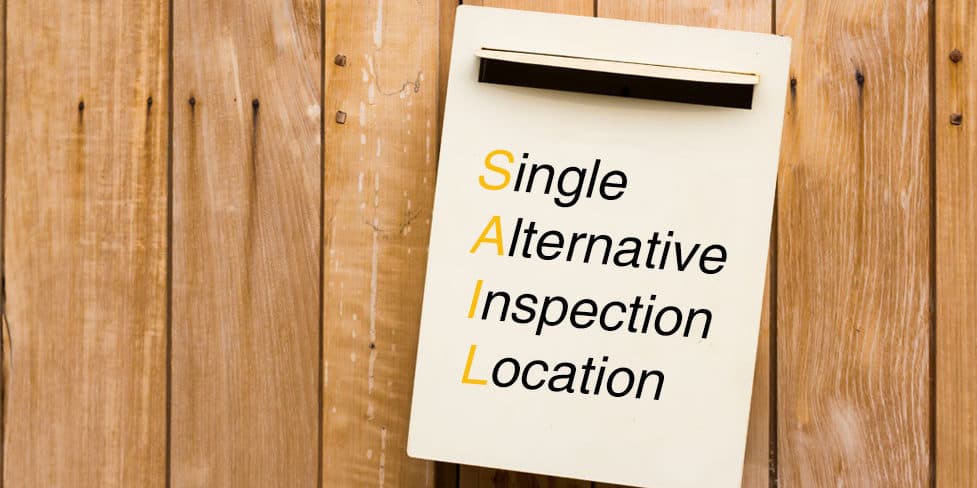A SAIL address is a Single Alternative Inspection Location where a company or LLP can keep its statutory records and make them available for public inspection. There is no legal requirement to have a SAIL address – it is simply used for convenience as an alternative inspection location to the registered office.
- A Central London registered office address for your company
- What is a director’s service address?
- What is a registered office address?
- What records do limited companies need to keep?
If you do decide to use a SAIL, it must be situated in the same UK jurisdiction as your registered office. You will need to tell Companies House and provide a list of the statutory records that you keep there.
If you do not use one, you are legally required to keep all statutory company records at your registered office. Alternatively. you can elect to keep information normally held in certain registers at Companies House instead. This latter option has been available to private companies since 30 June 2016.
What is the difference between a SAIL address and a registered office address?
A registered office is mandatory. It is the official address of a limited company, where mail and legal notices from UK government agencies (such as Companies House and HMRC) are delivered. This address is placed on the public Companies Register.
All statutory records must be kept at the registered office and made available for public inspection there unless a SAIL address is used or the company elects to keep the information at Companies House instead.
A SAIL is optional. It is an address other than the registered office where a company’s statutory records can be stored and inspected. If you decide to use one, you must provide the address details to Companies House and tell them what records are kept there. This information will be placed on public record.
Can a SAIL address be anywhere in the world?
No, a SAIL address has to be in the same jurisdiction as the registered office. This is the UK country where your company is incorporated – i.e. England and Wales, Wales only, Scotland, or Northern Ireland.
A SAIL address can be changed at any time as long as it stays in the same UK jurisdiction.
What records and registers can be kept at a SAIL address?
The company records and registers that private limited companies can keep at a SAIL address include:
- Register of members (shareholders or guarantors)
- Register of directors
- Register of company secretaries
- Register of debenture holders
- Register of People with Significant Control
- Register of charges and instruments creating charges
- Directors’ service contracts
- Directors’ indemnities
- Copies of company resolutions (incl. members’ ordinary and special resolutions; board resolutions; and written resolutions)
- Minutes of general meetings
- Documents relating to redemption or the purchase of own shares
All of these registers are available for public inspection.
Do I have to make my company records available for inspection?
Yes, private limited companies have a legal duty to make their statutory records available for inspection every working day between 9am and 5pm. Members of the company can view these registers for free. Members of the public are usually charged a fee prescribed by the company.
Pursuant to the Companies (Company Records) Regulations 2008, any person wishing to inspect a company’s registers must make a formal request to that company, stating the following information:
- if the applicant in an individual, his/her name and address
- if the applicant is an organisation, the name and address of the person making the request on its behalf
- intended purpose/use of information gathered during inspection of records
- whether the information is to be disclosed to anyone else. If so, the name and address of the individual or the representative receiving information on behalf of an organisation, and how the information will be used by that individual or organisation
- specified date and time of inspection
The applicant is normally required to provide the company with at least 10 working days’ notice of the specified inspection date. However, only 2 working days’ notice is required if:
- it is given during the notice period for a general meeting or class meeting; or
- the company circulates a written resolution during that period
The applicant must also give notice of the time they wish to commence the inspection, which can be any time between 9am and 3pm for a period of at least 2 hours (ending no later than 5pm).
In accordance with the Companies Act 2006 (section 117), within 5 working days of receiving a request to inspect the statutory records, the company must either:
- comply with the request; or
- apply to the court for permission to refuse the request if the company believes the inspection is not sought for a proper purpose
Will Companies House send my company mail to a SAIL address?
Companies House (and other government agencies) will not send any statutory mail to a SAIL address. All official government mail and legal notices will continue to be delivered to the registered office.
However, if you would like to have your company’s official government mail delivered to your SAIL address, you can simply change your registered office to that address. To do this, you will need to notify Companies House using form AD01.
How to register or change a SAIL address at Companies House
You can register or change a SAIL address at Companies House by submitting form AD02 via WebFiling. You must also file form AD03 to state which records have moved to the new location.
Alternatively, you can notify Companies House using 1st Formations’ free Online Company Manager. The information will be delivered instantly through our secure software filing system.
Simply log in to your existing customer account through our website, or register a new account online and import your company. You can also use this facility to report other changes to Companies House, view and update company details, and file Confirmation Statements.
Please note that the information provided in this article is for general informational purposes only and does not constitute legal, tax, or professional advice. While our aim is that the content is accurate and up to date, it should not be relied upon as a substitute for tailored advice from qualified professionals. We strongly recommend that you seek independent legal and tax advice specific to your circumstances before acting on any information contained in this article. We accept no responsibility or liability for any loss or damage that may result from your reliance on the information provided in this article. Use of the information contained in this article is entirely at your own risk.










Join The Discussion